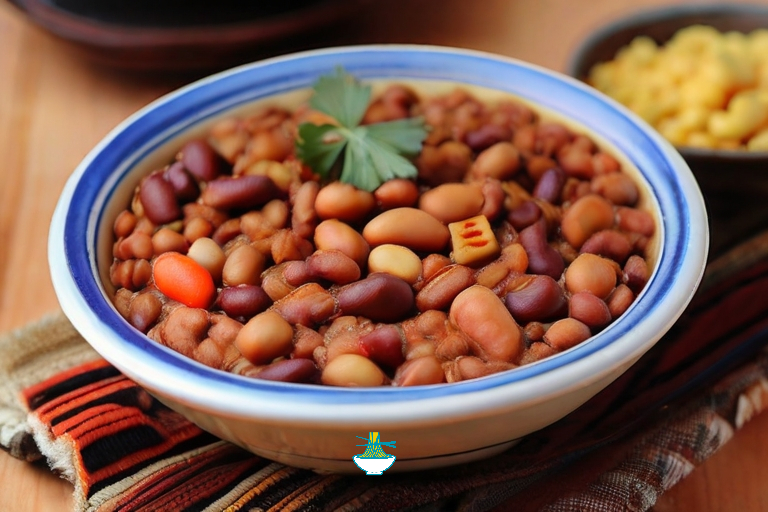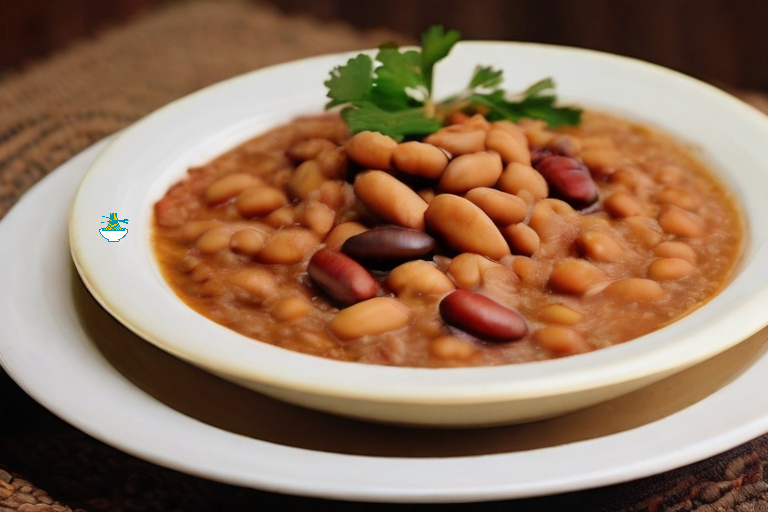Dikgobe is a traditional Botswana dish made from a nutritious blend of beans and maize (corn), symbolizing unity and sustenance in the country’s food culture. It's rich in protein, fiber, and essential nutrients, supporting digestion and overall health. However, for those managing blood sugar or with legume allergies, portion control and careful ingredient selection are advised. Proper soaking and cooking of beans also help avoid digestive discomfort.

Ingredients:
- 2 cups dried beans (cowpeas or preferred variety)
- 1 cup maize (corn), dried or fresh
- 1 large onion, finely chopped
- 2 medium tomatoes, diced
- 2 cloves garlic, minced
- 2 tablespoons vegetable oil
- 1 teaspoon ground coriander
- 1 teaspoon ground cumin
- 1 teaspoon paprika
- Salt and pepper to taste
- Water for cooking
Instructions:
1. Prepare the Beans:
- Rinse the dried beans thoroughly and soak them in water overnight (skip if using fresh beans).
2. Cook the Beans:
- In a large pot, add the soaked or fresh beans and cover with water.
- Bring to a boil, then simmer for 1-2 hours until tender.
3. Prepare the Maize:
- Soak dried maize in water overnight (skip this step if using fresh maize).
- Add maize to the pot when beans are halfway cooked. Continue simmering until both beans and maize are tender.
4. Sauté the Aromatics:
- In a separate pan, heat vegetable oil over medium heat.
- Sauté chopped onions and minced garlic until translucent.
5. Spice it Up:
- Add ground coriander, cumin, and paprika to the onions and garlic, stirring to coat the mixture with spices.
6. Combine and Simmer:
- Add the spiced onion mixture to the beans and maize. Stir in diced tomatoes.
- Season with salt and pepper to taste.
- Let the Dikgobe simmer on low heat for 20-30 minutes, allowing the flavors to meld.
7. Serve:
- Once Dikgobe reaches a rich, flavorful consistency, remove from heat.
- Serve hot, either on its own or with traditional side dishes like seswaa (pounded meat) or morogo (cooked leafy greens).

Nutrition Value:
1. 2 cups dried beans (cowpeas or preferred variety)
- Calories: 450 kcal
- Carbohydrates: 80g
- Protein: 30g
- Fat: 1.5g
- Sodium: 0mg
- Cholesterol: 0mg
- Vitamins: High in B vitamins (B1, B6, folate)
- Minerals: Rich in iron, magnesium, potassium, zinc
- Nutritional Benefit: Beans are an excellent source of plant-based protein and fiber, aiding digestion, supporting heart health, and providing essential minerals like iron and magnesium, which are important for energy production.
2. 1 cup maize (corn), dried or fresh
- Calories: 125 kcal
- Carbohydrates: 27g
- Protein: 4g
- Fat: 1.5g
- Sodium: 10mg
- Cholesterol: 0mg
- Vitamins: B vitamins (B1, B3, B6), vitamin C
- Minerals: Magnesium, phosphorus, manganese
- Nutritional Benefit: Maize is a great source of carbohydrates for energy and contains fiber, which promotes digestive health. It also provides essential vitamins and minerals like vitamin C and manganese.
3. 1 large onion, finely chopped
- Calories: 45 kcal
- Carbohydrates: 11g
- Protein: 1g
- Fat: 0g
- Sodium: 4mg
- Cholesterol: 0mg
- Vitamins: Vitamin C, B6
- Minerals: Potassium, manganese
- Nutritional Benefit: Onions are low in calories and rich in antioxidants, particularly quercetin. They provide vitamin C and fiber, which support the immune system and digestion.
4. 2 medium tomatoes, diced
- Calories: 30 kcal
- Carbohydrates: 7g
- Protein: 2g
- Fat: 0g
- Sodium: 10mg
- Cholesterol: 0mg
- Vitamins: Vitamin C, A, K
- Minerals: Potassium, folate
- Nutritional Benefit: Tomatoes are rich in antioxidants like lycopene, which is known for its heart health and cancer prevention properties. They provide vitamins C and A, boosting the immune system and promoting skin health.
5. 2 cloves garlic, minced
- Calories: 10 kcal
- Carbohydrates: 2g
- Protein: 0.5g
- Fat: 0g
- Sodium: 1mg
- Cholesterol: 0mg
- Vitamins: Vitamin B6, vitamin C
- Minerals: Manganese, selenium
- Nutritional Benefit: Garlic has immune-boosting properties due to its active compound allicin. It may help lower cholesterol levels and improve heart health.
6. 2 tablespoons vegetable oil
- Calories: 240 kcal
- Carbohydrates: 0g
- Protein: 0g
- Fat: 28g
- Sodium: 0mg
- Cholesterol: 0mg
- Vitamins: Vitamin E
- Minerals: None significant
- Nutritional Benefit: Vegetable oil provides healthy fats, particularly monounsaturated fats, which are beneficial for heart health. It also contains vitamin E, which supports skin health.
7. 1 teaspoon ground coriander
- Calories: 5 kcal
- Carbohydrates: 1g
- Protein: 0g
- Fat: 0g
- Sodium: 1mg
- Cholesterol: 0mg
- Vitamins: Vitamin C, vitamin K
- Minerals: Iron, magnesium
- Nutritional Benefit: Ground coriander adds flavor while providing antioxidants and anti-inflammatory properties. It can aid digestion and support the immune system.
8. 1 teaspoon ground cumin
- Calories: 8 kcal
- Carbohydrates: 1g
- Protein: 0g
- Fat: 0g
- Sodium: 10mg
- Cholesterol: 0mg
- Vitamins: Vitamin A
- Minerals: Iron, magnesium
- Nutritional Benefit: Cumin is known for its ability to enhance digestion and improve blood sugar control. It is rich in iron and contains antioxidants.
9. 1 teaspoon paprika
- Calories: 6 kcal
- Carbohydrates: 1.5g
- Protein: 0g
- Fat: 0g
- Sodium: 2mg
- Cholesterol: 0mg
- Vitamins: Vitamin A, vitamin E
- Minerals: Iron
- Nutritional Benefit: Paprika is a good source of antioxidants, especially vitamin A and carotenoids, which promote eye health and reduce inflammation.
10. Salt and pepper to taste
- Calories: Negligible
- Carbohydrates: Negligible
- Protein: Negligible
- Fat: Negligible
- Sodium: Varies with amount used
- Cholesterol: 0mg
- Vitamins: None
- Minerals: Trace amounts of minerals like potassium
- Nutritional Benefit: Salt and pepper enhance flavor. When used in moderation, salt provides essential sodium for bodily functions, while pepper offers antioxidants.
11. Water for cooking
- Calories: 0
- Carbohydrates: 0
- Protein: 0
- Fat: 0
- Sodium: 0mg
- Cholesterol: 0mg
- Vitamins: None
- Minerals: None
- Nutritional Benefit: Water is essential for hydration and helps facilitate cooking without adding calories or nutrients.


Comments